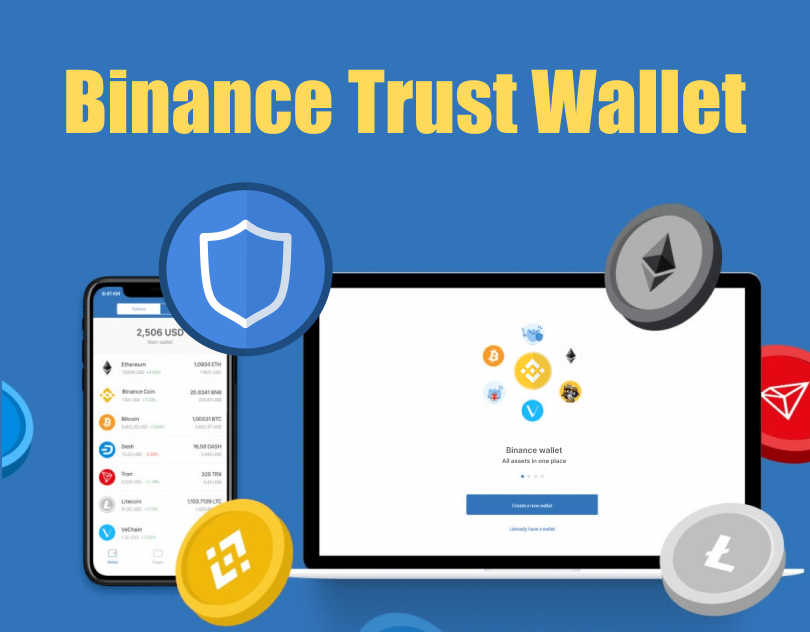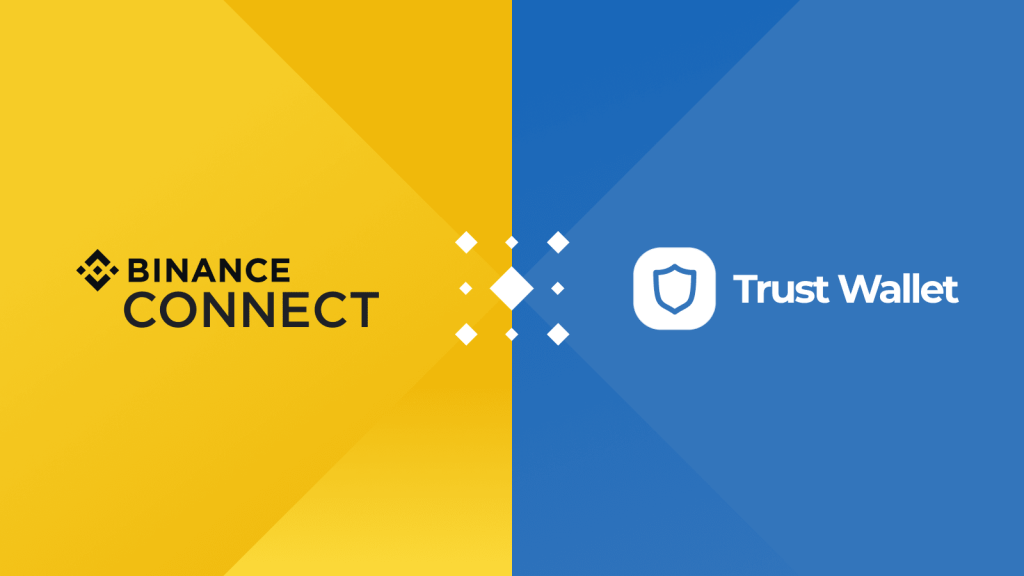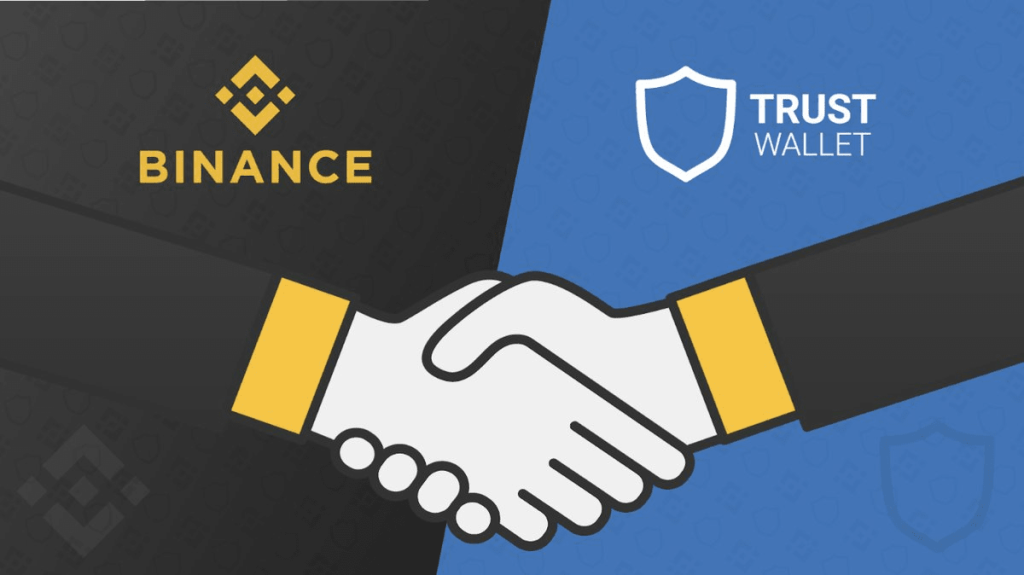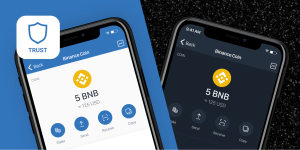Is Binance a Trust Wallet?
No, Binance is not Trust Wallet. Binance is a centralized cryptocurrency exchange, while Trust Wallet is a decentralized wallet app used for securely storing and managing crypto assets. Trust Wallet also supports Binance Smart Chain and other blockchains.

Binance vs. Trust Wallet: Key Differences
How Binance Works as a Cryptocurrency Exchange
- Centralized Exchange: Binance is a centralized exchange, meaning users trade cryptocurrencies directly through Binance’s platform. Binance acts as an intermediary, holding users’ funds while facilitating buy, sell, and trade orders.
- Wide Range of Services: Binance offers various services like spot trading, futures, staking, savings, and more. It allows users to access a wide variety of cryptocurrencies and even participate in DeFi (decentralized finance) services.
- Account Verification: Binance requires users to create an account, undergo KYC (Know Your Customer) verification, and store their crypto in exchange-controlled wallets for trading. This centralized approach gives Binance control over user accounts and transactions.
The Role of Trust Wallet in Managing Crypto Assets
- Non-Custodial Wallet: Trust Wallet is a non-custodial wallet, meaning users retain full control over their private keys and assets. There is no third-party intermediary, unlike Binance, where funds are held by the exchange.
- Supports Multiple Blockchains: Trust Wallet supports a wide range of cryptocurrencies across different blockchains, including Ethereum, Binance Smart Chain, Solana, and more. It provides a decentralized storage solution for these assets.
- Access to Decentralized Applications: Trust Wallet allows users to interact with decentralized applications (dApps) directly from the wallet. This gives users more control over their assets and activities without relying on a centralized exchange like Binance.
Understanding Trust Wallet and Binance
How Trust Wallet Supports Binance Smart Chain
- Seamless BSC Integration: Trust Wallet supports Binance Smart Chain (BSC) by allowing users to store, send, and receive BSC-based tokens such as BNB and BEP-20 tokens, providing a seamless experience for Binance ecosystem users.
- Decentralized Applications (dApps): Trust Wallet enables users to interact with decentralized applications (dApps) on Binance Smart Chain directly from the app, facilitating access to BSC-based DeFi protocols, games, and NFTs.
- Cross-Chain Compatibility: Trust Wallet can handle assets from both Binance Smart Chain and Ethereum, allowing users to manage and swap tokens between different chains with ease, enhancing the wallet’s versatility.
The Benefits of Using Trust Wallet with Binance
- Lower Transaction Fees: By using Trust Wallet to store and send BSC assets, users benefit from significantly lower transaction fees compared to Ethereum-based networks, making it an affordable solution for frequent transactions.
- Easy Access to Binance Ecosystem: Trust Wallet provides users easy access to the Binance ecosystem, including features like staking, BNB storage, and the Binance DEX (decentralized exchange). This access is essential for users who are actively involved in Binance’s platform.
- Full Control Over Assets: Unlike Binance’s centralized exchange, Trust Wallet is a non-custodial wallet, meaning users retain full control over their private keys and assets, ensuring greater security and privacy.

Is Binance a Custodial Wallet?
How Binance Manages Your Crypto Assets
- Centralized Control: Binance is a centralized exchange, meaning it controls your crypto assets when stored on its platform. Users must trust Binance to securely hold and manage their funds while facilitating trades.
- Deposit and Withdrawal Process: When you deposit crypto into Binance, it is stored in Binance-controlled wallets. Similarly, when you withdraw, Binance processes the transaction and sends the crypto to your designated address.
- Account and Asset Security: Binance offers various security measures like two-factor authentication (2FA), encryption, and cold storage for assets. However, as a custodial service, Binance has the ability to access and control the assets stored on its platform.
Comparing Custodial and Non-Custodial Wallets
- Custodial Wallets: In custodial wallets, like Binance, the exchange holds the private keys to your crypto assets. While this makes trading and transactions more convenient, it also means you rely on the exchange’s security and policies.
- Non-Custodial Wallets: Non-custodial wallets, such as Trust Wallet, give users full control over their private keys and funds. The user is solely responsible for securing their wallet and assets, eliminating reliance on a third party.
- Security and Control: With custodial wallets, there’s a risk that the platform could be hacked or face issues, potentially leading to the loss of assets. Non-custodial wallets offer more security by allowing users to retain full control over their funds and private keys.

How to Use Binance with Trust Wallet
Connecting Trust Wallet to Binance for Transfers
- Generate a Receiving Address: Open Trust Wallet and select the cryptocurrency you wish to receive. Tap “Receive” to generate your wallet address. Copy this address for use in Binance.
- Initiate Transfer on Binance: On Binance, go to the “Withdraw” section. Choose the same cryptocurrency you’re transferring and paste the address from Trust Wallet into the recipient field.
- Confirm and Complete: Double-check the address and network to ensure everything is correct. Once confirmed, Binance will process the transaction, and your funds will appear in Trust Wallet shortly after.
Using Binance for Buying Crypto and Trust Wallet for Storing
- Buying Crypto on Binance: Binance offers a wide variety of cryptocurrencies for purchase. You can use fiat currency (USD, EUR, etc.) or other cryptocurrencies to buy assets directly on Binance.
- Transfer to Trust Wallet: After purchasing crypto on Binance, it’s a good idea to transfer it to Trust Wallet for enhanced security. Trust Wallet is a non-custodial wallet, meaning you have full control over your private keys.
- Secure Storage and Access: Trust Wallet allows you to securely store your crypto assets and access decentralized applications (dApps). Using Trust Wallet for storage ensures that your funds are safe from potential exchange-related risks.

Security Features of Binance and Trust Wallet
How Binance Protects Your Funds and Data
- Two-Factor Authentication (2FA): Binance uses two-factor authentication (2FA) to add an extra layer of security to your account. This ensures that even if your password is compromised, a second factor is required to access your account.
- Cold Storage: The majority of user funds on Binance are stored in cold wallets, meaning they are kept offline and out of reach of hackers. Only a small portion is stored in hot wallets for immediate access during trading.
- Anti-Phishing Protection: Binance offers anti-phishing codes, which allow users to verify that emails or communication are coming from Binance. This helps protect against phishing attacks that could lead to a loss of funds.
Trust Wallet’s Security Protocols for Safe Crypto Storage
- Non-Custodial Wallet: Trust Wallet is a non-custodial wallet, meaning only the user has control over their private keys. This reduces the risk of hacking or third-party interference that could occur in custodial wallets like exchanges.
- Backup Seed Phrase: Upon setup, Trust Wallet provides a 12-word seed phrase that allows users to recover their wallet in case of device loss or theft. Keeping this phrase secure is vital for maintaining control over your assets.
- Encrypted Private Keys: Trust Wallet encrypts private keys locally on your device, ensuring they are not stored on any central server. This protects your funds from online threats while giving you sole control over your crypto assets.





